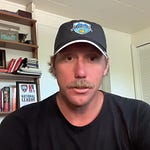Thanks you to Pool Reflections subscriber Jocelyn for asking the question!
Since we are not specifying a gender, we can carve up the year into four phases.
Pre-season ramp-up is crucial to hit the ground running.
D3 Men play in the Fall, and D3 Women play in the Spring, so those portions of the year are what we will consider “in- season”.
Post-season - Winter/into early Spring for Men and Summer for the Women’s side is also a key differentiator from a training timing perspective, as I am aware of a number of D3 programs that allow their athletes some extended time off.
Building a training program
Without the luxury of knowing a particular team and individual athlete’s strengths and weaknesses, this is a challenge.
However, there are a few “one size fits all” things that I can recommend.
Encourage agency from your athletes.
Create a detailed “after-action report” of your season. Communicate clearly with each individual athlete what they can be working on to expand their role on the team. Reflect on how you could be a better coach too!
Build a culture of play outside the pool.
Philosophy of Daily Improvement
I used to be a believer in the “more is better” mentality. I came from a distance swimming background. More reps, more practice, more swim sets, more legs, more defensive drills.
But I have shifted my thinking a bit over the years to more of a consistency based, holistic health model. You should definitely be sore after some workouts, but consistently administering beat-downs in swim sets and the weight room oftentimes leads to a flat, more illness prone team at the end of the season.
If the plan is to train year-around, start with fundamentals of swimming, fundamentals of defense and introduce balls into practice and tinker with throwing mechanics.
Starting with proper swim mechanics is a massive advantage. Most water polo players are specializing in the sport earlier and earlier. By the time they hit the collegiate level, many of them have never received elite swim instruction.
If you can shave seconds off of your 100 time, and the only thing you have done is add some additional length to your stroke, imagine the benefits as you start getting into VO2 Max training. We’re talking a lot more rest in your more grueling swim sets without any improvement in your body’s basic attributes.
Post-Season
Spend time reflecting and collecting your thoughts on what the team did well and what the team needs to improve upon, and consider graduating Seniors whose production you will need to replace, along with who you have incoming.
You should have sit-downs with every athlete on where you see them next year, what their role is, and where they can improve to expand their role. In this meeting you should be giving them direction on what they need to work on during their own time.
This is your time to become a better athlete and add new skills that you will employ in the upcoming season. Find some sports outside the pool that will help your overall game and give you confidence.
Want better, more explosive legs and to improve your hand-eye? Play beach volleyball. Want general endurance and better leg dexterity? Play pick-up soccer. Want more confidence in a grappling exchange? Go do jiu-jitsu a few times a week. Mobility, core strength, and balance? Yoga is great for that. It should also come as a shock to no-one that surfing is great cross-training.
The key to a successful post-season is consistency. You want to get a little better holistically as an athlete every day. Few things hurt your consistency more than getting injured, so be mindful of your limits as you try new things.
To that end, the weight room is for injury prevention first, and adding strength/power/mobility second. This is your time to make gains though. A max bench press or squat session right before season or in season is just silly.
Acquire new skills. You should be making athletic gains, strength/power/mobility gains, and endurance gains, but individual athletes should also be focused on making role-expansion gains.
For example, say you are a center-defender, and your center that led your team in natural goals and kick-outs drawn was a senior. Someone will have to make up for some of that production. Maybe adding some post-up moves off of a power drive from the 3 position make sense.
Your post-season is “money in the bank” time. Attack your weaknesses, break up the monotony of training, get faster, and add skills.
Pre-Season
The coach should now have a pretty good understanding of how the pieces fit together on the team for maximum effectiveness. Swim sets should start to shift from a focus of getting athletes fast and fit to a more water polo centric approach. Take that newfound speed and endurance and apply it to water polo sets.
Specific examples include:
10 x 200s “Water Polo IM” - (50 Butterfly arms, breaststroke legs, 50 backstroke lunges, 50 breaststroke, 50 lunge freestyle) - give the team ~30-45 seconds recovery between each repeat.
16 x 100s on 1:30 - no pushing off walls with feet, only push off with your hands and hip over. Every even lap swim backstroke in between the yellow 15 meter markers.
There are numerous ways to start getting your swim sets into more of a water polo cadence, and coaches can even make the decision to further specialize the work when it comes to positions.
Focus in the weight-room shifts to maintaining the newfound strength you have in the off-season, improve core/stability/mobility, and increasing power. You want your weight room work to make you feel “froggy” - go into the season healthy, but with a workload that you can back off a bit from as the season progresses.
Tactically, the team should have a good expectation of their roles and go-to plays, but tinkering throughout the course of the season is something coaches should expect.
In Season
Maintain your 3-4 days a week in the weight room. I personally like some defensive drilling at every practice (we do it as a part of our warm-up).
A consistent day off is valuable. These should be planned during a weekday as many programs have games on Saturday’s and Sundays. Monday’s, Tuesdays, or Wednesdays are all good options. Just find a day and stick to it. Not all players will take it off, but a consistent day off gives student athletes a chance to catch up on school work, and come back mentally reset.
Everything during season is about maintenance. You can get a little stronger, and a little faster, but what matters during the season are the games themselves. Personally, I like to maintain a bit of the “grind” mentality at the beginning of the season and slowly taper off toward more important games.









